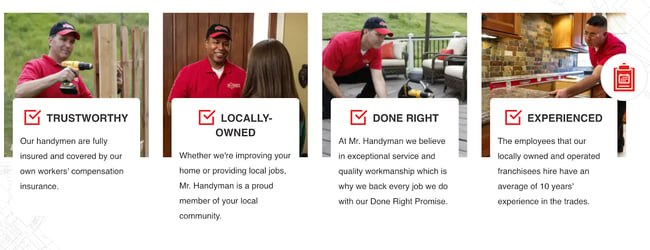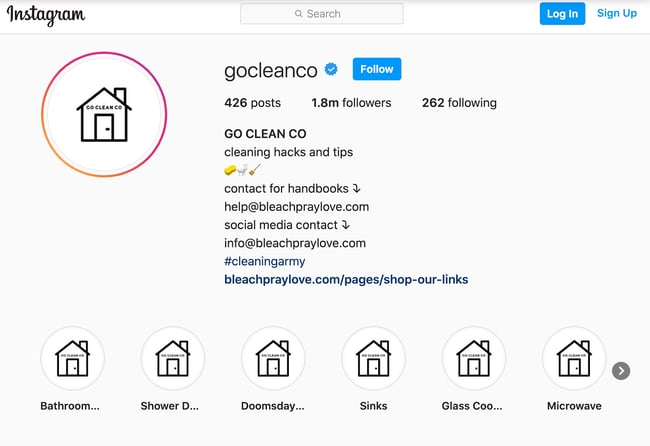SCHEDULED UPDATE 100
Airbnb Co-founder, Brian Chesky, said, "If we tried to think of a good idea, we wouldn’t have been able to think of a good idea. You just have to find the solution for a problem in your own life."
If you’re like Brian and you’ve already thought about a solution for a problem you encounter in your life — or you’re on the path to doing so — then starting a small business may be in your future. It may also be for you if you dream of clocking out of your nine-to-five job for the last time and becoming your own boss.
But while you might feel ready for a new venture and passionate about your idea, you might be looking for some direction.
To help get you started, here's a list of small business ideas separated into three major sections:
The first step to becoming a successful entrepreneur is finding a business idea that works for you. In this article you’ll walk away with dozens of small business ideas you can start from home and scale up as your clientele grows.
Best Small Business Ideas
1. Handyman

Image Source
Are you always fixing things around the house? Often on-call when friends need small projects completed? Create a website, conduct a competitive analysis to determine what your time and expertise are worth, and turn to the friends you’ve helped before for referrals.
2. Woodworker
Similarly, if you have a passion for crafting beautiful furniture or other home goods out of wood, that could be a small business niche for you. Get started by listing a few of your pieces on sites like Etsy. Once you build a following, consider starting a website, accepting custom orders, or expanding to refinishing work and upholstery.
3. Online Dating Consultant
Dating consultants usually charge for their time. They help people create successful online dating profiles, source possible matches from outside the typical online channels, and offer a level of personalization that a site like Tinder can’t. Think you’ve got a knack for the match? This might be the business for you.
4. Sewing and Alteration Specialist

Image Source
People will always need clothing hemmed and buttons mended — and you could be the person to do it. If you love sewing, start by offering simple services like those mentioned above and expand your repertoire to dressmaking and design as you build a customer base and demand.
5. Freelance Developer
From building websites for other small businesses to providing technical support for certain projects, quality web development is in high demand right now. As a web developer, you'll naturally have a technical skill set. Distill your knowledge and expertise so customers who don't have your experience are able to understand what it is you'll be helping them achieve.
To help with this, test your messaging on friends and family who don’t have a firm understanding of the work you do. If they’re able to summarize what you do, your messaging is likely effective among people outside of your industry.
6. Personal Trainer
Offer in-home consultations, personalized nutrition and exercise regimens, and community boot camps to get the word out. Don’t forget to populate an Instagram feed with inspirational quotes, free exercise videos, and yummy snack ideas as well — it’s a common way for fitness gurus to build their brands in our digital world.
If you choose to go this route, it’s OK to start small at first, then scale up. For instance, MOURfit is a personal training business in Indianapolis that started in a shared gym, then grew to a private gym that offers group fitness, personal training, and nutrition services.
7. Freelance Graphic Designer
Set your own hours, choose your projects, and build a portfolio and business you’re proud of. From website design to blog graphics and more, many companies seek out experienced graphic designers for support on a variety of projects.
If you’re just starting out with graphic design, try these eight tips and tricks that are ideal for beginners. If you’re more experienced but need to build your portfolio to attract clients, these prompts will get your creativity flowing in no time.
8. Life/ Career Coach
If you have experience navigating career, personal, and social transitions successfully, put it to good use as a life or career coach. Many of us are looking for guidance in our careers — and finding someone with the time to mentor us can be tough.
Life/ career coaches don’t come cheap, but they are able to offer clients the intense and hands-on training and advice they need to make serious moves in their personal and professional lives. After all, everyone needs some uplifting advice from time to time.
Image Source
Looking for inspiration? Nariah Broadus has dedicated more than 20 years to helping people create better working environments and navigate change successfully as a career and leadership coach. Check out her story for more inspiration to get started with this small business idea.
9. Resume Writer
Creating a resume, cover letter, and — when necessary — portfolio for a new job can be tough and time consuming. That’s why many people hire help. Assist clients with tailored resumes, beautifully edited cover letters, and carefully-crafted portfolios that make it impossible for employers to ignore.
10. Freelance Writer
If you have writing skills, there’s someone out there willing to pay you for them. Write blog posts, magazine articles, and website copy galore — just make sure you have a body of work built up to share with potential clients. Even if you create a few sample pieces to have on hand, they’ll help exhibit your work and attract new business.
11. Translator
Speak a foreign language? Start a translation service. Consider specializing in a specific genre of translation, like medical or financial translation, as you might be able to fill a niche need in your community.
12. Garden Designer
Many people have the willingness to do the dirty work in their backyards, but few have the know-how to complete the first part of this process — designing and planning the backyard space. Draw up the designs for your clients’ outdoor spaces and let them do the actual digging.
13. Ecommerce Store Owner
Do you create, collect, or curate anything special? Consider starting an ecommerce store and turning your hobby into a full-time job. Whether you need somewhere to sell all that pottery you’ve been making, or an excuse to search for the sports memorabilia you love tracking down, an ecommerce store can make it financially viable for you to pursue your passion.
14. Landscaper
Mowing, tree-trimming, and seasonal decor are all neighborhood needs. If you have or can acquire the equipment, a landscaping business can be a lucrative affair.
15. Videographer
Video production requires you to have invested in the equipment up front which can be quite expensive. But that’s also what makes your services so valuable. Make sure you have a reel of your work to share or create a website with several selections of your work available for interested viewers.
To learn more about the art of videography, check out The Ultimate Guide to Video Marketing.
16. Photographer
Start by conducting photo shoots for your family and friends. As you build a body of work, ask for referrals and reviews. Photography businesses often grow by word of mouth, so create a Facebook page where you can tag recent clients. Videos that you tag those clients in will show up in their friends’ newsfeeds where they can view your work. You can also ask them to leave reviews on your Facebook business page.
If you’re not sure where to start with freelance photography, take a look at Erica Clayton’s journey into the business. Her advice? Give yourself a firm deadline to turn a profit.
17. Travel Planner
The time of the travel agent might be passing, but people are still looking for those with a knack for more nontraditional travel coordination. If you always plan the perfect vacations complete with beautiful hotels, the ideal location, and a bevy of delicious restaurants lined up for every evening, consider advertising your services as a more modern approach to travel planning.
18. Car-detailing Specialist
The devil is in the details and you can be too. Car-detailing services that travel to the client are convenient for busy people who can’t find the time to run through the car wash. With this business, your clients only have to pay and the service will be done for them before they know it. Just make sure you have the flexibility, transportation, and equipment to take your business on the road.
19. Home Inspector
Working as a home inspector requires a certification and a great deal of expertise, but it can offer a flexible work schedule and stable income. Confirm the licensing requirements in your state before getting started with this type of small business. You’ll want to make sure you’re providing the best service to your clients by having all of your credentials in order.
20. House Cleaner
With a low barrier to entry, house cleaning can be a great way to start doing what you love — soon. Consider advertising to homes in your neighborhood and get more bang for your buck by earning a few small businesses as clients as well. They’ll usually bring in a higher paycheck for a similar amount of work.
Need some inspiration? This small business cleaning service grew virtually overnight on Instagram after their content went viral during the pandemic.

Image Source
21. Personal Chef
We all love to eat, but few of us have the time or energy to cook healthy, delicious meals. Advertise your services to local families and businesses alike. To save on start-up costs, consider scheduling certain groups of clients together — say, vegetarians — so you can cook larger quantities of the same dish.

Image Source
Chef Paul’s mouth-watering dishes are available to clients across the country. His clientele niche consists of athletes, corporate businesses, and local gyms.
22. Property Manager
Many people maintain properties they don’t live in — often based in different cities or states. As a property manager, you can help a property owner ensure their home is being well taken care of, handle small fixes as they arise, and serve as a liaison to renters.
23. Packing Services Facilitator
Moving is always a pain, and many people hire the entire packing process out. Want to have a steady stream of clients? Partner with a local moving service who will refer new clients to you.
24. Massage Therapist
Soothe aching muscles and promote peace for your clients as a massage therapist. Look into training and certification courses in your city and state and invest in a portable bed to take on client visits.
25. Crafter
Creating novelties by hand is a fun and unique way to start a small business. Whether you make jewelry, knitted comfort items, or even custom wigs, there’s probably a market for your products. Tap into your audience with creative marketing on social media and search engine optimize your website for the unique products you make.
26. Bed and Breakfast Owner
This is another business venture that will require you to research the correct licensure from your state, but it will be well worth it to see your dreams come true. Consider what guests will be traveling to your area and create special packages and themed stays that coincide with their interests in your locale.
27. Interior Designer
Similar to landscape design — there are many people who have the ability to buy the furniture and home decor they need to fill their rooms, but few who know where to start. It might take some time to build a portfolio but documenting your projects and sharing them online can build a fanbase beyond your wildest dreams.

Image Source
Need inspiration? Check out Sandra Cavallo’s interior design Instagram account.
28. Nonprofit Owner
If you dream of devoting your life to a cause you believe in, it might be time to start a nonprofit. You’ll need to incorporate your business and file for 501(c)(3) tax-exempt status — and then you’ll be required to meet ongoing standards of compliance, but the payoff is making a meaningful impact on a cause you believe in.
29. Tour Guide
Love the local history of your city or state? Consider becoming a tour guide. Sure, you’ll need to conduct plenty of research to be able to do the job well, but that’s half the fun. Set yourself apart by offering tours that speak to a specific niche of your community’s history.
Some tour guides, like the ones at Freedom Trail in Boston, offer historical walking tours of their town’s most haunted spots while others curate guided foodie tours for guests to get a true taste of the city.
30. Tutor
Whether you’re a math whiz, piano master, or Shakespeare aficionado, there’s someone out there who needs a little help in your area of expertise and is willing to pay for it. Advertise your services through local schools, community colleges, community centers, and even social media to get the word out and build a customer base.
31. Consultant
If you have significant experience in or knowledge of a specific subject, consider becoming a consultant. Perhaps you’re an expert at hiring practices, have a knack for SEO, or have led multiple sales teams to six-figure success. Identify your expertise and market yourself as a consultant and charge the going rate.
32. Clothing Boutique Owner
If you dream of building your own fashion empire, why not start with a local boutique? Build buzz with impressive window displays, inspiring social media accounts, and heavy community involvement.
33. Event Planner
You might choose to specialize in a specific type of event — like weddings or company meetings — or set yourself up as an event planner of all trades. If you’re highly organized, are detail-oriented, and have experience planning large events, it might be time others benefit from your skills.
34. Specialty Food Store Owner

Image Source
Gourmet foods, cheeses, sake, wine — you name a food, there’s a specialty food store out there for it. Put your passion for exotic olive oils to good use and open a store like American Provisions where you offer the kind of expertise and selection your audience couldn’t dream of getting from their local grocer.
35. Personal Assistant
Again, if you’re an organized, highly-detailed person, the life of a personal assistant might be for you. Don’t want to be tied to one office or person all day, every day? Consider becoming a virtual assistant, which allows you a more flexible work environment.
36. Food Truck Owner
Always dreamt of owning a restaurant but not quite ready to take the plunge? Test out your concepts with a food truck. It’s a great way to become familiar with food and restaurant licensing in your state, see what people like and don’t like, and build a ravenous following before ever opening or investing in a brick-and-mortar location.
Taco Nganas, a taco truck in Memphis, TN, started with one food truck and expanded to three, building a loyal customer base along the way.
37. Consignment Shop Owner
If you have an eye for style but don’t want to invest in the inventory of a brand-new boutique, consider going consignment. It will allow you to curate a collection of clothing that matches your goals and aesthetic, without the overhead of a boutique selling entirely new garments.
38. Caterer
If that personal chef gig is too restrictive for your schedule, consider catering instead. Pick your projects, work fewer but larger events, and hone in on your time management skills.
39. Gym owner
Kickboxing gyms, yoga studios, CrossFit, oh my! Turn your passion for fitness into a community for others by creating your own gym — start one from the ground up, become an affiliate, or open a franchise location.
40. Daycare Owner
Childcare continues to be in high demand. While nannies and nanny shares are popular right now, a good daycare is hard to find. Fill a need in your neighborhood by opening your own. And, as always, make sure you’re complying with your city and state’s zoning, licensure, insurance, and inspection requirements.
41. Boutique Agency Owner
What’s your specialty? Whether it’s marketing, social media, or PR, it might be time to start your own agency. Many other small businesses need this type of help but don’t have the resources or volume to necessitate a full-time position.
Consider building a small team and learn from other entrepreneurs who’ve successfully started their own agencies, like Duane Brown of Take Some Risk.
42. Coffee Shop Owner
Turn your caffeine addiction into something a little more lucrative. Opening a franchise or buying an existing shop are lower-risk entry points to the coffee game but they usually require a little more cash up front. Starting a shop from scratch requires a little more planning and a lot more work — but it also maximizes your earning potential in the future.
43. Moving Company
A truck, moving equipment, manpower, and the correct permits and insurance are the building blocks of starting your own moving company. Before you buy your first fleet of trucks, however, start small with a moving van and keep your costs low.
Still sound like too much of an initial investment? Consider offering packing services only, which have a much lower financial barrier to entry.

Image Source
You could even take a niche approach to the industry as Astro International has by offering international moving services.
44. Home Staging
If you have a flare for interior design, a staging service might serve as your creative outlet and professional calling. You can build a portfolio with little initial investment by staging homes using the owner’s existing furnishings and decor. Most stagers eventually build up an inventory of furniture as they become more established and network with area realtors.
45. Dog Walker, Groomer, or Trainer
Licensing and insurance will be the two most important factors in opening a dog walking, grooming, or training business, but your canine colleagues will surely make up for the initial red tape. To test the waters before jumping in, consider walking dogs through companies like Rover. Ready to run your own show? Consider a franchise like Dogtopia.
Home Business Ideas
These home business ideas give you a few more business options that are either based at home or online.
1. Coding
Frontend, backend, and every type of code in between, this skill requires no in-person interaction with your clients. But one skill you’ll want to carry over from the in-person world for this type of business is active listening. It can be easy to zone out while building a product, but developing a connection with the client is just as important as developing the code for their website.
If you keep the client top of mind when you can’t be around physically, you can ensure that you’re meeting their development needs with your coding work.
2. Vending Machine Owner
Since 2015, the growth rate for vending machine businesses has increased 1.4%. Even as social distancing restrictions are still in place, this business can still be lucrative if you choose the right locations. High-traffic is key — places like hospitals, schools, and community centers are smart places to start placing your machines to generate enough revenue to cover cost and turn a profit.
3. Social Media Manager
Do you have a knack for social media? As a social media manager, you can use your skills to manage the social media accounts for companies and even individual people. Influencer marketing has become more common and many influencers rely on marketing agencies or employees to help them run their social channels.
4. Data Entry Clerk
Many businesses seek data entry clerks to help them enter information into their computer systems and spreadsheets. If you have strong computer and typing skills, this might be the business for you.
5. Audio or Video Editor
As of March 2021, there are 1.75 million podcasts available to listeners. For this reason, brands are turning to audio and visual content to connect with consumers. The catch is that many don't have the time to invest in the production of this content, or they don't have the skills to do it. Audio and video editors are in demand when it comes to producing quality content for hungry audiences.
6. Voiceover Artist
Speaking of podcasts and videos, many content creators recognize the value and level of professionalism that great voice talent can bring to a project. There are gigs out there for podcast intros/outros, narration for explainer videos, or even voice work for audio books.
7. Pet Sitter
Do you have a passion for pets? Consider becoming a pet sitter. While the pet's owners are away on vacation, either host their pet at your home or make visits to their home. Join a pet sitting service like Wag to get started.
8. Vacation Host
Have you ever used a home-sharing service instead of a hotel? You could make a living by hosting visitors in your own home or renting out a room. Consider becoming a host with companies like Airbnb.
Is your head buzzing with small business ideas yet? After all that brainstorming, you’ll need a practical plan to get started with your new small business.
9. Candy Seller
If you grew up in a close-knit, southern neighborhood, you're familiar with the "Candy Lady" around the neighborhood. This home business can be started by anyone who's trustworthy in the community. Aside from selling the most popular snacks, a candy seller can provide the neighborhood with fresh fruit and produce that may be harder to find if you live in a food desert.
How to Start a Small Business at Home
- Write out your business plan.
- Identify your small business idea.
- Start as a side business or hobby.
- Decide on your software.
- Create a business plan.
- Decide whether you'll be an LLC or sole proprietorship.
- Create a business bank account.
- Determine if your business idea works well from home.
- Set up an office.
- Get to work!
No business plan? No business. Particularly if your small business idea requires investors, you'll need to draft up a business plan to provide an overview of your market positioning, your financial projections, and your unique competitive advantages. You can download HubSpot's free business plan templates for free to get started.
Whether you choose an option from the list above or have another idea up your sleeve, it’s important to have the experience, training, or skills necessary to be successful. Want to run a daycare but have never even visited a successful daycare center? Spend time conducting research to learn whether this is really the right fit for your experience, interests, and target audience.
Can you get your business off the ground as something you do in the evenings or on the weekends (a.k.a. a side job)? This allows you to make some mistakes, test the market, and understand whether your idea has legs before you quit your nine-to-five job and lose your primary income.
You’ve got a lot of things on your plate when first starting up. But one step that’s critical (and often forgotten by first-time entrepreneurs) is deciding on the software that can help you be more efficient as your business grows.
Every business is different — but almost all companies can use software to help with analytics, project management, accounting, bookkeeping, email marketing, and other basic day-to-day tasks.
Once you know your idea has the potential to succeed, it’s time to build a business plan. Not sure where to start? Try this business plan template.
Business plans should identify what makes your offering different from competitors. They should also be short and actionable. And your business plan should evolve with your business.
Two common legal structures for small businesses are limited liability corporations (LLCs) and sole proprietorships.
An LLC is a more complex business structure than a sole proprietorship and can include individuals, corporations, and other LLCs as members. Additionally, LLCs are not subject to a separate level of tax and offer the business owner liability protection and tax advantages. LLCs are formed on a state-by-state basis.
Sole proprietorships are businesses owned and operated by one person and are not identified as a separate entity from the owner by the government. While a sole proprietorship is the simplest business structure, sole proprietors are personally liable for their business.
Once you have a legally formed business and have been issued an Employer Identification Number (EIN), open a bank account specifically for your business. Having a business bank account is essential for keeping your personal and business finances separate which can help you gain an accurate picture of your business’s cash flow and financial health.
Additionally, keeping your personal and business finances separate makes bookkeeping and tax preparation easier.
Many banks offer business checking and savings accounts. Business checking accounts typically do not have a limit on the number of transactions that can take place, and issue a debit card that can be used for making business purchases. However, these checking accounts do not accrue interest.
Business savings accounts typically earn interest over time but have a limited number of transactions that can occur each month. When you’re just starting out, look for a business bank account that does not have a minimum balance requirement so you are not penalized for having low funds as you work to build your business.
Ask yourself whether your business idea will work well from home. Some businesses simply aren’t suited to be based from home. If you want to run a dog boarding center but live in an apartment without a backyard, you might want to consider a dog walking business instead.
If your business idea is well-suited for being run from home, it’s still important you have a designated workspace. While a home office might not be possible, consider setting aside a corner in your living room or putting a desk in your bedroom for a space that inspires you and creates the conditions for success.
Need a more professional space? If you conduct client-facing work requiring you to be on video calls, no one wants to see your rumpled sheets in the background. Check out local coworking spaces for memberships that earn you access to conference rooms, desk space, and more.
You’ve put in the hard work and I’ve got good news … it’s only going to get harder. But most entrepreneurs will agree that the payoff of being your own boss, making your own hours, and working on projects that you’re passionate about will pay dividends for the rest of your life.
Selecting a small business idea to work on is a personal decision. Money is important, but you’ll need more motivation than that to keep going. Bounce ideas off your friends and family until you reach the perfect idea that works for your schedule, fulfills your life’s passion, and makes financial sense. Don’t be afraid to ask for help throughout this process — and remember to have a little fun while you’re putting in the work.









